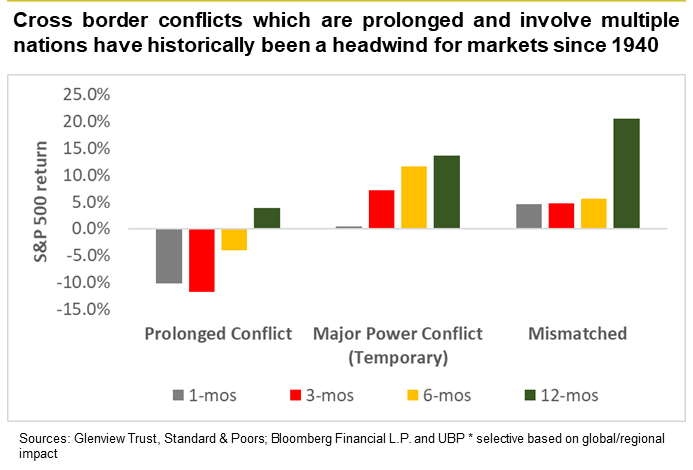Commentary from Norman Villamin, Group Chief Strategist at Union Bancaire Privée (UBP).
- The Hamas invasion of southern Israel over the weekend, while an eruption of an on-going regional conflict and humanitarian crisis has the potential to expand to a prolonged conflict that historically has been a headwind for global equity markets.
- A look back at the impact of such geopolitical conflicts – ranging from coups/assassinations, to terrorist events, and including cross border wars between nation-states – on the S&P 500 going back to 1940, in aggregate they suggest modest upfront impact of such events which dissipate quickly (please see Russia-Ukraine: Implications for Global Markets, March 2022 for more details).
- However, the type and duration of event is significant in understanding the potential impact upon markets
- Indeed, domestic terrorist attacks (2004 Madrid, 2005 London, etc.) have historically had only temporary impacts on markets, with the S&P 500 rising, on average 3-12 months afterwards.
- Importantly, however, prolonged conflict between or eventually drawing in multiple nations has presented at least a 6-month headwind to US equity returns with the notable exception being the start of hostilities in Korea.
- Implications
- Thus, the risk that the largest incursion into Israel since 1973 transforms from a localized event to one that is prolonged and engulfs a wider range of nations should be among the key concerns for investors. Indeed, a prolonged conflict has the potential to draw in Iran and imperil the potential normalization of Saudi-Israeli ties that reported to be close to being announced.
- With Iranian exports and US releases from its strategic petroleum reserve having virtually fully offset Saudi supply cuts since September, a global response which reduces Iranian supply where Saudi Arabia does not compensate with increased production would create a renewed supply shock for global energy markets.
- With energy equities historically cheap on an absolute basis and relative to the broader market, the sector may offer a safe haven amidst the geopolitical uncertainty introduced over the weekend.
- Thus, the risk that the largest incursion into Israel since 1973 transforms from a localized event to one that is prolonged and engulfs a wider range of nations should be among the key concerns for investors. Indeed, a prolonged conflict has the potential to draw in Iran and imperil the potential normalization of Saudi-Israeli ties that reported to be close to being announced.







